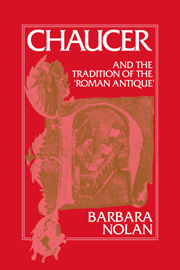Book contents
- Frontmatter
- Contents
- Acknowledgments
- List of abbreviations
- Introduction
- 1 Benoît de Sainte-Maure's Roman de Troie and the compositional practices of the roman antique
- 2 Plaits, debates, and judgments in the Roman de Thèbes, the Roman de Troie and the Roman d'Eneas
- 3 The poetics of fine amor in the French romans antiques
- 4 From history into fiction: Boccaccio's Filostrato and the question of foolish love
- 5 Boccaccio's Teseida and the triumph of Aristotelian virtue
- 6 Saving the poetry: authors, translators, texts, and readers in Chaucer's Book of Troilus and Criseyde
- 7 The consolation of Stoic virtue: Chaucer's Knight's Tale and the tradition of the roman antique
- Epilogue
- Notes
- Bibliography
- Index
4 - From history into fiction: Boccaccio's Filostrato and the question of foolish love
Published online by Cambridge University Press: 11 September 2009
- Frontmatter
- Contents
- Acknowledgments
- List of abbreviations
- Introduction
- 1 Benoît de Sainte-Maure's Roman de Troie and the compositional practices of the roman antique
- 2 Plaits, debates, and judgments in the Roman de Thèbes, the Roman de Troie and the Roman d'Eneas
- 3 The poetics of fine amor in the French romans antiques
- 4 From history into fiction: Boccaccio's Filostrato and the question of foolish love
- 5 Boccaccio's Teseida and the triumph of Aristotelian virtue
- 6 Saving the poetry: authors, translators, texts, and readers in Chaucer's Book of Troilus and Criseyde
- 7 The consolation of Stoic virtue: Chaucer's Knight's Tale and the tradition of the roman antique
- Epilogue
- Notes
- Bibliography
- Index
Summary
The literary path that leads from the twelfth-century feudal courts of northern France to the Angevin court at Naples, from Benoît de Sainte-Maure's Roman de Troie to Boccaccio's Filostrato (c. 1335–40), is not, in its broadest material outlines, difficult to trace. The Troy story, particularly in Benoît's version, enjoyed an enormous popularity in Italy. Benoît's poem was copied by Italian scribes, and it was translated in the later thirteenth century into Latin by a southern Italian judge, Guido delle Colonne. Quite independently, Binduccio dello Scelto turned the Roman de Troie into Italian prose. Benoît's poem also made its way to King Robert's court at Naples in at least one French prose version – the translation mentioned at the end of the last chapter. But, while Boccaccio too takes up Benoît's matter of Troy in his Filostrato, his version, written in stanzas of ottava rima, seems remarkably different from all of its forebears in many respects.
The Filostrato has not generally won high praise among critics. Many scholars, isolating the poem's intense, subjective love interest, have tended to treat the whole work somewhat dismissively. It is, Barry Windeatt says, “a lyrically sensual romance … presented as a projection of the author's own scarcely-veiled feelings and experience through the character of Troilo.” David Wallace concludes that although the Italian poem “provided Chaucer with an excellent story line … it had little to teach him as an opus.”
- Type
- Chapter
- Information
- Chaucer and the Tradition of the Roman Antique , pp. 119 - 154Publisher: Cambridge University PressPrint publication year: 1992



